Interview mit den Cherryholmes, Shooting Stars der Bluegrass Szene
© Februar 2007 / Bruno
Michel
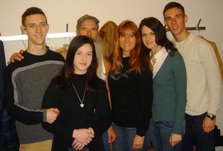 It’s rather unusual – especially in the well respected Bluegrass music community
– that a band reaches highest levels of appreciation after only four years
of professional performance. It’s even more unusual that such a band originates
from California. The family band Cherryholmes did just that. They started
playing Bluegrass in 1999, had their first professional appearance in 2002
and were awarded Entertainer of the Year by the International
Bluegrass Music Association (IBMA) in 2006. I took the chance to talk
It’s rather unusual – especially in the well respected Bluegrass music community
– that a band reaches highest levels of appreciation after only four years
of professional performance. It’s even more unusual that such a band originates
from California. The family band Cherryholmes did just that. They started
playing Bluegrass in 1999, had their first professional appearance in 2002
and were awarded Entertainer of the Year by the International
Bluegrass Music Association (IBMA) in 2006. I took the chance to talk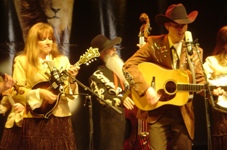 to the parents of the family, Jere (JC) and Sandy Lee (SC) Cherryholmes during
their second stay in Switzerland.
to the parents of the family, Jere (JC) and Sandy Lee (SC) Cherryholmes during
their second stay in Switzerland.
bm:
You only got in touch with Bluegrass in 1999 after a personal tragedy. Today
you’re honored Entertainer of the Year. Coming from L.A. and going to Bluegrass
Stardom – how does that fit together?
JC: Well, it doesn’t. The area where I grew up
in L.A. was one hundred percent hispanic. We were pretty much living on an
island in our house. We had to search for Bluegrass music. You find it in
California but not as easy as you would in other states such as Kentucky or
Tennessee. First we were looking for tapes and started to play along. As we
homeschooled our kids, we integrated  music
lessons in the schedule. We had to make real efforts to feel it and play it
right. None of the kids read music, Sandy taught them all how to play by ear.
music
lessons in the schedule. We had to make real efforts to feel it and play it
right. None of the kids read music, Sandy taught them all how to play by ear.
bm:
Jere, you were part of a gang in L.A., but you also were in the Navy, both
were homeschooling your children. These are a lot of different lifestyles
you were mixing. How did you keep discipline in the house?
JC: We had a pretty disciplined house already.
I brought my Navy training into the house (laughs). If you want your kids
to go on well in life – whatever they do – discipline plays a big part. Children
sometimes have a hard time to see value in being self-disciplined, so you
have to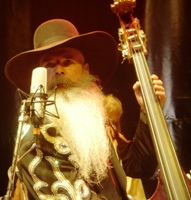 teach them. Especially when you do homeschooling, you have to have a tight
schedule that everyone follows, right? (looks to Sandy). Say something so
I don’t have to do all the talk (laughs).
teach them. Especially when you do homeschooling, you have to have a tight
schedule that everyone follows, right? (looks to Sandy). Say something so
I don’t have to do all the talk (laughs).
SC: Well, Jere rightly mentioned that you need
to have slots for each class you want to teach and make sure, things are being
followed. Already before starting the band, we were dancing with the kids
just as a recreational thing. But once we got the band started, we had to
include dancing lessons in that schedule – on top of all other things. I did
also individually teach each of the kids in music for, say twenty minutes,
and then we brought them all together to practice jointly what they’ve learned.
Sometimes they had to learn a fiddle or guitar part to a song of which they
did not know how it sounded until we brought all together.
 bm:
I heard that none of you has a personal email account. How do you rate today’s
thinking of most people who believe they need to be reachable at any point
and any time?
bm:
I heard that none of you has a personal email account. How do you rate today’s
thinking of most people who believe they need to be reachable at any point
and any time?
JC: Well, it’s another discipline thing. We do
have cell phones and we figure we can handle things over that. We felt that
email and it’s related efforts might become cumbersome. Some bands have a
manager, an agent or even a fan club, where people could address questions
to and they would get answered. We are doing most of these things ourselves.
And with our touring schedule of currently some 300 gigs per year, we simply
do not want to neglect anybody by not answering their request. Crucial things
such as signing papers or similar can always be done via a fax machine on
the road.
bm:
Four children and their parents equals to six individuals and therefore it
might be six opinions. Who decides in case you’re once not in agreement?
SC: Well, the bottomline decision – as it should
be in a family – lies with the father or maybe the father and mother together.
But we’re also very 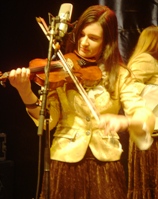 much
open to the kid’s ideas. However, you have to have a head that takes final
decisions out of wisdom and life experience, the kids naturally can’t do that
well. It’s however very important that you don’t make decisions based on your
feelings but on experience. Take the musical styles as an example. One might
come up with a neat song that they play for us. We have to decide if that
would fit in what we currently do and what the people like. And it may not
be the appropriate time now for such a song.
much
open to the kid’s ideas. However, you have to have a head that takes final
decisions out of wisdom and life experience, the kids naturally can’t do that
well. It’s however very important that you don’t make decisions based on your
feelings but on experience. Take the musical styles as an example. One might
come up with a neat song that they play for us. We have to decide if that
would fit in what we currently do and what the people like. And it may not
be the appropriate time now for such a song.
bm:
At an age between 14 and 23, most young folks have other things in mind than
playing Bluegrass with their parents. What – except family roots – keeps them
hangin’ on?
JC: It’s already grown past that. When we first
started it was of course the family. Now it’s a career. Each one of them are
getting noticed for their skills and value in the band. We were up for eleven
awards recently. The guitar player was nominated in his category as was the
banjo player and one of the fiddlers. I was up for bass player. So everybody
gets some sort of recognition and they’re even asked to play on other artist’s
projects. So they look at it as part of their career to go that extra mile
to reach the next level.
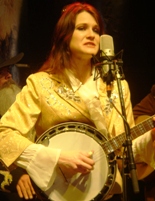 bm:
If an alien would land his spaceship at a bluegrass festival where you are
performing, what would be the first thing you’d warn him about?
bm:
If an alien would land his spaceship at a bluegrass festival where you are
performing, what would be the first thing you’d warn him about?
SC: (laughs) Watch where you step. A lot of these
festivals are in the cow pasture.
JC: It depends on where the festival is. In Kentucky
they drink a lot of moonshiner during festivals, in Wisconsin it would be
beer. So, overall I might just warn him that not everybody living on this
planet is like this (laughs).
bm:
Jere, you once said that you all were “survivalists in life” trying to achieve
things on your own. If people look back on your lifes in 50 years,
what would you like them to say about you?
SC: I hope they would have respect for what we
did at the time we lived in. We try to do something different, trying to hold
on to the old family tradition. Also, on our forty acres out in Arizona, we
try do to that. We don’t have electricity out there, as an example. Also the
fact that we live on the road and have almost not seen our home in four years
is not the usual way. Sometimes I think people lost that vision that you can
be together and do things the simple way. There’s more things to a satisfied
live then measure luck by what you can buy.
bm:
You’ve achieved a lot in just a few years. If you’d find the lamp of Alladin,
what would your 3 wishes be to the Genie?
SC: (laughs) Jere and I might armwrestle over
these because we might not have the same opinion. I take the first wish of
which I know we agree on, then he can take the other two. My wish would be
that as a family we always remain close and that our kids values will always
be the ones we raised them on.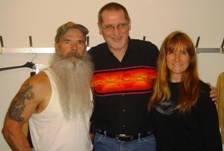
JC: I’d wish we’d stay healthy, focused and not
get blinded by ambition. I feel we have something to offer to the people,
not just the music, but also from a family
point of view. As to the third wish, I don’t really know. We’re not wishing
for material things, never did.
bm:
If you were to interview the Cherryholmes, which question would you ask them
that I did not ask?
JC: I’d ask myself: Do you still have a brain
(laughs). Because all my hair has gone does that mean my brain’s gone, too.
Or, I’d ask if we still love what we’re doing….stupid question…
SC: (laughs) I don’t know. It’s too hard to ask
myself a question and answer it at the same time…
bm:
Fair enough. Thanks a lot for the interview and good luck for your shows.